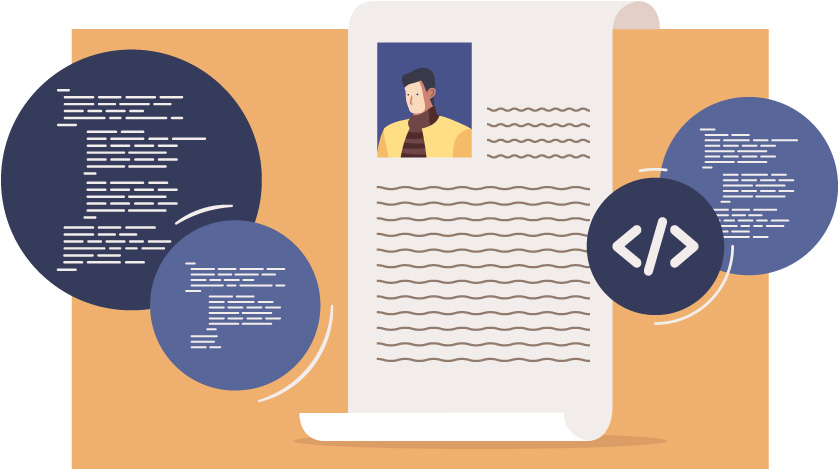So you want to be an iOS developer. You’ve studied Objective C or Swift in depth, familiarized yourself with the Xcode IDE, and mastered the Cocoa Touch framework.
Now it’s time to start thinking practically about what you need to do in order to get that first developer job. And that’s exactly what we’ll walk you through in this article, from initial research to applications and interviews, all the way to your first few weeks on the job.


What do they really want? What do YOU really want?
So you’ve got all the basic skills that the Internet says iOS developers should have. Great! But guess what? Google “iOS junior developer job” and you’ll find page after page of job ads that ask for skills and technologies you’ve never even heard of. So what’s the deal? Did the Internet lie to you? No. It’s just that app development is a job—and like any other job, each company has its own way of doing things and its own needs, depending on its business model and client base. Some degree of specialization—beyond the basics—is going to be required to function as an iOS developer in an actual company. So how do you know what you should learn in addition to the basics? Think about what kind of app development you want to do. Look at it this way. Say you were aiming for a career in medicine. Would you say “I just want to be a doctor, I don’t care what kind,” and leave it at that? No way! You’d be thinking—very early on in your studies—about the sort of medicine you’d like to practice, the sort of physician you wanted to be: Pediatrician or surgeon? Oncology or cardiology? Researcher or family practice? Programming is no different. While you don’t have to know exactly where you’ll end up, you should at least try to figure out the kind of app development you’re interested in. Do you want to be a game designer? Are you interested in creating applications for business? Do you see yourself working in a large company or at a small start-up? Once you’ve figured out what sort of job you want to do, scan job ads that most closely fit the sort of role you’re looking for (even if they’re not in your city). And talk to people who are already working in those jobs. See what skills people seem to be looking for and then—you guessed it—acquire those skills!Show them what you can do
An iOS developer who hasn’t ever created a working app isn’t really an iOS developer. If you want to get hired, you have to have some samples of your work to show off to potential employers. You need a portfolio. But how can you build a portfolio before you’ve actually worked as an iOS developer!?! Easy answer. You make one anyway. If you took full courses like Udemy’s “Become an iOS developer from scratch” or worked on one of Treehouse’s many iOS projects, you should already have some functioning apps that you created while you were learning. Polish these a little bit and you have perfect portfolio material. You could also look to create portfolio items by volunteering (and do some good in the process). Websites like Catchafire match nonprofits that need help with experts who are looking to donate their time and skills for a good cause. These sites are a great place to find organizations that need some technical help. If they’re actively looking for an iOS app, you’re in business. But even if they’re not, you can still reach out to these organizations and see if you can offer them a useful app that could help them with their work. Once you’ve got some projects you’re proud of, you’ll need to build a website to display them. An easy, professional, and low-cost option that many developers choose is to create a project portfolio site using GitHub Pages.
Apply, Apply, Apply
OK, so you’ve got the knowledge, you’ve got a strong portfolio, and you know what kind of job you’d like to be in. The next step is to get an interview! You can go the traditional route of applying through job boards—especially those dedicated to programming jobs like Stack Overflow Jobs or GitHub Jobs. You can also do it the old-fashioned way, by networking. Start by using the contacts you made while researching the iOS developer specialization you were most interested in. Finally, remember that applying for jobs is a skill that can be learned—and improved upon. You should be ready to fine-tune your approach if need be, using setbacks as learning experiences. And you should actively seek out real feedback whenever possible. For example, if you don’t get much of a response from your initial round of applications, see if you can talk to some of the hiring or HR people at those companies. Ask them what you could do to strengthen your application. It may not land you a job at that company, but you’d be surprised at how many people are willing to help you in your job search, if you just take the time to ask!
The Interview
Coding interviews are notoriously different from other kinds of professional interviews. And you should definitely familiarize yourself with the common questions that come up in these interviews, and especially the questions you’ll have to answer to get hired as an iOS dev. But don’t forget that development is also a business, just like any business, and all of the other basics of professionalism and interviewing still apply! Dress the part, be friendly and approachable, and do your best—even if you’re nervous—to project relaxed confidence to your interviewer. And remember, above all, that your answers to their questions should focus more on what you can do for them, rather than on why working at their company would be great for you. Lastly, it may be comforting to remember that your interviewers aren’t just wondering if you can do the job, from a technical point of view. They’re also wondering if they want you to. Will you be a good fit with their company culture? Will you be a good colleague? Would they trust you to be the face of the company and talk to clients? Sometimes these things mean even more to employers than hard coding skills. So research the company thoroughly, be your professional, personable self, and let them see why you’re the perfect person for the job. Bonus pro tip: Send a written note after every interview, thanking the interviewer for her or his time and saying how you enjoyed the discussion, preferably on the very same day as your interview, so that it arrives without too much delay. HR folks and hiring managers say that they’re always pleasantly surprised by this—and a little shocked at how few people nowadays bother with this basic professional courtesy.Next steps
If you didn’t get the position, don’t give up. Sometimes it takes a few rounds of interviews to land that dream job. But even more importantly, learn from the experience. Reflect on what you could do better in the next round of interviews, and, if possible, get in touch with your interviewer to ask them what advice they can offer you on improving your interviewing skills. Again, as with applications, even though you shouldn’t expect this to result in a job at the company that turned you down, interviewers are human beings too, and a lot of them are very happy to help someone else out. Sometimes the advice you get from people who said “No” to you will help you more than anything else—and get you to that “Yes” you’re looking for. If you did get the job, congratulations! The first few weeks will probably be a blur of activity. If you have a case of nerves or “impostor syndrome,” try to keep calm and remember that every developer has felt that way too at one point in their career. Some keys to surviving? Find a mentor. It doesn’t necessarily have to be your boss or even someone at your company. But reach out to a more experienced programmer who you can talk to and ask for advice on how to navigate the world of professional development Remember that in programming, the learning never stops (ever). So embrace this. Spend some of your free time developing your skills, reading everything you can get your hands on about the new technologies you’ll be introduced to over the coming weeks. You can catch up on your favorite TV series in a few months. Keep the lines of communication open. Remember that the very worst thing you can do is bumble through your first assignment because you didn’t stop to clarify a task or ask about something you weren’t sure about. Don’t get in over your head—because then it will be too late—but instead ask questions and make sure you’re on the same page as your teammates from the very beginning. That way, you won’t risk falling behind, and you’ll be able to do your work with the confidence that comes from knowing you’re on the right track. And the last thing? Enjoy yourself! You made it, after all the study and hard work, and are doing what you love. Try to remember to have a little fun as you start your new career!
Tagged iOS developer